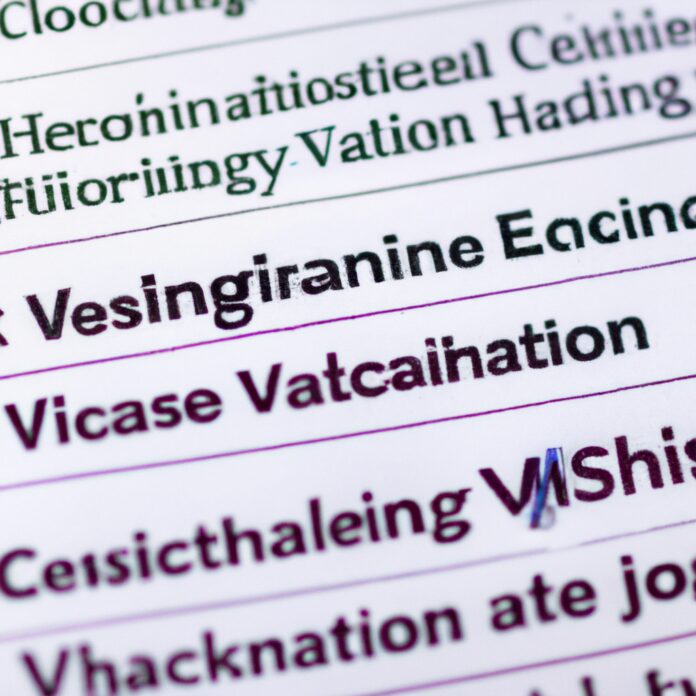With the advent of new scientific and medical advances, one of the key developments of the 21st century has been the development of vaccines. Vaccines are a critical tool in the fight against diseases that have plagued humanity for millennia, and their role in reducing deaths from certain infectious illnesses is well-documented. Yet there is a growing concern about vaccine hesitancy – the reluctance or refusal to have oneself or one’s children vaccinated. In this article, we delve into this compelling issue. We take a look at the actions and campaigns which have emerged to address it, and the important role that informed choices can play in making sure vaccinations remain a primary way of protecting ourselves and others from disease.
1. Understand the Facts: Discussing Vaccine Hesitancy
As healthcare professionals contend with the increasing dangers of preventable diseases, they must also grapple with the ever-present vaccine hesitancy. Vaccines offer a critical layer of protection against the spread of communicable diseases, yet many people are unwilling to receive them due to misunderstanding of facts. To bridge the gap between those in favor of vaccines and those who are not, it’s important to understand the facts.
This discussion “understanding the facts” can start from ground zero by explaining what a vaccine is. Vaccines are scientific products made from dead or weakened versions of viruses or bacteria, allowing the body to produce immune responses without causing an illness. Taking a vaccine triggers the body’s defense system to recognize the virus or bacteria as foreign invaders and make antibodies to protect itself in the future. Vaccines offer the most effective method of defense against infectious diseases.
In addition to that, vaccinations can help prevent more than just contagious diseases. Many vaccines are created to aid in preventing cancer. Vaccines such as Gardasil 9, for example, can help protect against cervical cancer, as well as various genital and anal cancers. With such protection, the risks of developing or transmitting cancerous conditions are drastically reduced.
Finally, it is important to note that vaccines are rigorously tested before being distributed, and administrations are closely monitored to ensure safety and efficacy. Think of it as getting the startup checked once and then tested exhaustively before being sent out on the roads. Vaccines take 12 to 15 years to pass through the safety and efficacy testing process before they are released to the public. Vaccines are continually monitored and studied for any potential side-effects, so while rare, some risks do exist.
- Vaccines are scientific products made from dead or weakened viruses or bacteria
- Vaccines can help to reduce the risk of developing or transmitting certain nuclues
- Vaccines are rigorously tested and closely monitored to ensure safety and efficacy
2. Assessing the Risks: Exploring Vaccination Concerns
When it comes to vaccination concerns, it is essential that parents and healthcare providers take the time to fully assess the risks associated with each vaccine option. There are a number of potential issues that parents should be aware of when it comes to vaccinations:
- Safety: Vaccines are carefully tested and monitored, but rare reactions can still occur.
- Efficacy: Vaccines may not work as well as expected or provide full protection, and different strains may require boosters.
- Conflicting Information: As research evolves, the medical establishment might alter vaccine recommendations or have differing opinions.
In addition to researching the various potential risks associated with each vaccine, it is a good idea to have a frank discussion with healthcare providers to ensure that a healthcare decision is best for your family. Understanding both the official medical advice as well as any unique risks that are particular to you or your family is key when making a healthcare decision, particularly when it comes to vaccination concerns.
It can be helpful for parents to seek clarity from medical pros whenever possible, as opposed to making a decision based solely on popular opinion or hearsay. Above all, it is important to remember that decisions about health should be made with guidance from a professional healthcare provider.
3. Moving Forward Together: Building Public Health Confidence
As the world starts to open up following the COVID-19 pandemic, it is now more imperative than ever to prioritize the maintenance of public health confidence. Governments, businesses, and individuals must continue to work together to ensure that our communities and economies can recover swiftly, safely, and successfully. Here are three essential steps:’
- Open Conversations: Encourage open, public dialogue about safety and well-being. Healthcare providers, public health professionals, and other local stakeholders should openly discuss the risks and benefits of re-opening communities and determine the best way forward.
- Shared Responsibility: Everyone needs to share in the responsibility to ensure public health confidence. Mask-wearing, social distancing, and other precautions need to be understood and practiced not just by individuals, but also by businesses, organizations, and other local entities.
- Adapt & Adjust: As the situation evolves, governments, businesses, and individuals must remain agile in order to effectively respond to the many challenges ahead. It is therefore important to establish mechanisms that quickly allow for feedback, adaptation, and adjustment in order to best protect public health confidence.
By taking the necessary measures to safeguard public health confidence, communities and economies around the world can come back stronger than ever before. It is through our collective efforts that we can bring the world forward and get back to living well and working together.
4. Empowering Choices: Educating on Vaccine Benefits
Vaccines are a powerful tool for establishing and maintaining health and a cornerstone of preventative healthcare. To recognize the impact of vaccines, and to understand why it is important to be informed about their benefits, it is essential to investigate the decision-making process.
Education is Key
Building a strong foundation of knowledge regarding vaccine efficacy is a cornerstone to making well-informed decisions. Vaccinated individuals must understand the risks associated with vaccination, while also understanding the greater impact of their decision to place public health needs before personal choice. Education can help individuals to appreciate the potential of vaccination, to evaluate the options, and the importance of planning in advance for vaccine visits.
Understand Benefits & Risks
It also helps to know that vaccination does not always provide absolute protection against illness. Vaccination can also be important for individuals without direct contact with the virus. By understanding the nuances of the available vaccines, individuals can make an empowered choice of which one is best for them.
Create a Plan
In addition to understanding the benefits and risks associated with vaccination, it is essential to create a plan for taking action. This includes recognizing the importance of specific vaccine schedules and how to utilize online tools to determine scheduling needs. Finding a trusted vaccination provider can also be a step in the process to ensure that the vaccine is delivered in the correct dose and at the appropriate frequency.
- Educate on vaccine benefits
- Understand risks & benefits
- Create a plan for taking action
- Find a trusted provider for the vaccine
5. Navigating the Debate: Supporting Informed Decisions
It’s no small thing to make an informed decision, especially when analyzing a hot-button issue. But there are a few steps you can take to help navigate the debate more easily. Below are 5 tips to consider when fermenting a decision.
- Check your Why. Make sure the issue aligns with your beliefs and goals, otherwise it won’t have much gravity in your decision-making.
- Go Straight to the Source. Check reliable news sources and cite the original source. Get your information only from trusted sources.
- Gather Opinions Learn the arguments from both sides. Even if you’re skeptical of a certain side’s argument, it can be beneficial to gain awareness of the other opinion.
- Propose Solutions. Reacting to the problem is not sufficient. Start constructing a list of solutions and determine which ones would work best.
- Don’t Forget the Long-Term. Situations can change almost overnight. Analyze the potential long-term effects of your decision by evaluating the issue in terms of economic, social, and political variables.
In the end, it’s important to recognize that many issues are complex and require thorough examination. Limiting yourself to one opinion or viewpoint can be detrimental to your decision-making process. Taking the time to research, reflect, and make an informed decision will be beneficial for achieving whatever it is you hope to gain from the debate.
Vaccines are an essential part of keeping us safe and healthy, and understanding the facts behind the myth and fear surrounding them is a crucial step in ensuring everyone is protected. Empowering individuals with the information they need to make informed and empowered choices about vaccine care can lead to a better-educated and healthier population overall. Let’s work together to break down the barriers to vaccines and open the door to informed choice.





